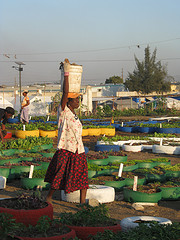Sanitation Solutions Emerge after Haitian Earthquake
Monika Roy with SOIL writes: Bonswa from Haiti. Monika here, working down in the Caribbean with SOIL (Sustainable Organic Integrated Livelihoods). SOIL is a U.S. NGO focused on EcoSan systems, incorporating hygiene education and developing sustainable business models through humanure compost sales. We started up north in Cap Haitien in 2006 building public EcoSan toilets (double vault, urine-dividing) for communities that wanted one, but moved operations to Port au Prince when the earthquake hit in 2010. Cap Haitien still holds the majority of those public toilets built by SOIL, which are managed by schools, community groups, clinics, and cooperatives. The few toilets operating on a drum-collection system in Cap Haitien are located in Shada 2 (one of the most impoverished slums here) and the drums are collected twice a week to be taken to our off-site composting facility.
Port au Prince primarily does emergency EcoSan systems in IDP (internally displaced person) camps running on the same drum-collection system. These toilets serve about 20,000 people, and we’ve generated so much compost since the earthquake that now we’re starting to donate compost to community gardens and sell it to other organizations. With the Emergency EcoSan program firmly in place, we’re now working on evaluating the public toilets in the north for usability, cleanliness, and community involvement, as well as developing a new program for private household EcoSan toilets to run on a drum-collection system.
Though we’re a big EcoSan presence here, there are some other great projects happening too. Give Love is also a U.S. NGO consulting and providing technical assistance to EcoSan projects since the earthquake. One of my favorite EcoSan projects here in Haiti is one they’ve got going on at an after-school center and garden. Give Love doesn’t do urine-diving seats here for the fact that children’s anatomy doesn’t allow them to properly use the seat (they are too small!). Thus, both urine and feces fall into the same drum to be mixed after each use with bagasse (the abundant carbon material SOIL uses as well, a by-product of sugarcane production).
If ya’ll are interested in other happening EcoSan projects here in Haiti, here are a few more. VivaRio is a Brazilian organization working on clean water distribution in camps as well as a BioGas project on the side. There are now upwards of 80 biodigestors in place with the first ones built being ready to empty – and VivaRio will experiment composting the bio-sludge. Going back to immediate humanure composting projects, Silent Grace Foundation is a Puerto Rican organization incorporating EcoSan into their community development program. What’s different about their EcoSan project is that they work in a flood zone so all their toilet and composting facilities are needing to be constructed several feet above ground. Last, but not least, Haiti Communitere is an overarching organization with a large compound space for small organizations to meet and execute projects. Particularly fascinating is their aquaponics systems, using fish feces to grow plants. I’m curious to see if human feces could be incorporated into that aquaponics system (as Give Love has a few toilet projects there), but this is a question to explore in the future!
Author’s Biography: Monika Roy grew up in Sacramento, California and graduated from UC Berkeley in 2009 studying Environmental Economics and Sustainable Agriculture, though her growing passion is learning about Ecological Sanitation (EcoSan) systems. She is currently working as a volunteer with SOIL in Haiti for a few months (and maybe longer) while thinking about pursuing graduate work in either Public Health or Sanitation Engineering. If you would like to contact her in regards to EcoSan projects, information, or job possibilities, she can be reached at monikaaroy at gmail dot com.

